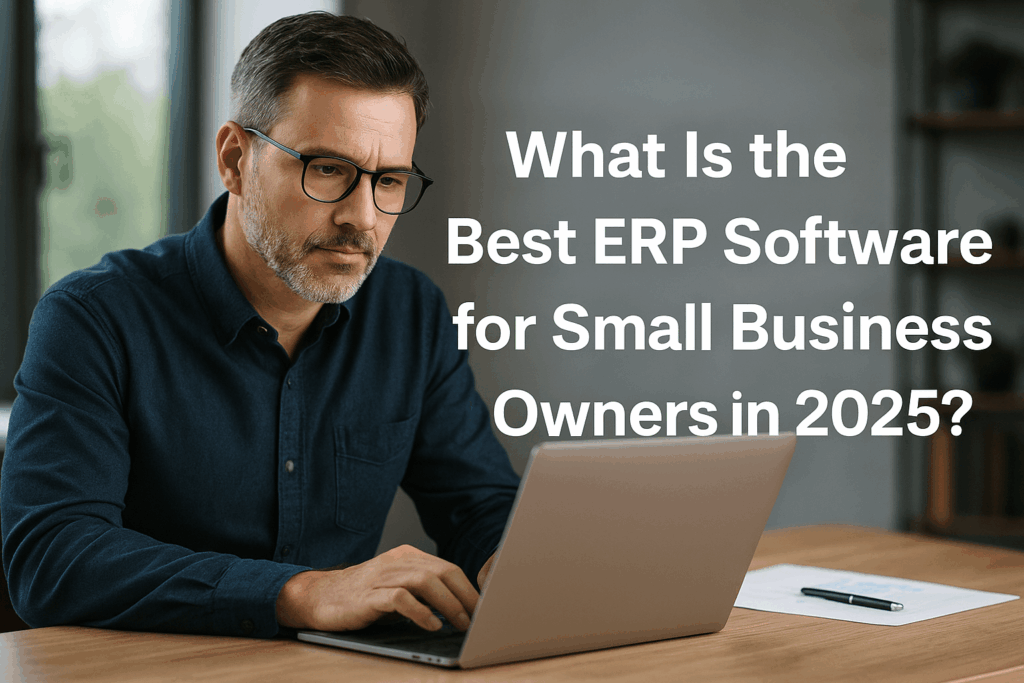What Is the Best ERP Software for Small Business Owners in 2025?
Choosing the right ERP software can transform a small business, helping streamline operations, reduce errors, and boost growth. In today’s fast-moving digital landscape, small businesses need solutions that are affordable, scalable, and easy to use. In this guide, we break down everything you need to know to find the best ERP software for small business needs in 2025.
Why ERP Matters for Small Businesses
ERP (Enterprise Resource Planning) software centralizes business operations—like finance, inventory, HR, sales, and CRM—into one integrated platform. For small business owners, that means:
- Reduced manual errors
- Improved collaboration
- Real-time data access
- Faster decision-making
- Lower operational costs
The right ERP for small business use is no longer a luxury; it’s a strategic advantage.
Key Features to Look for in Small Business ERP
Not all ERP platforms are built with small businesses in mind. Here’s what to prioritize:
1. Affordability
- Transparent pricing (no hidden costs)
- Pay-as-you-go or monthly plans
- Modular approach so you only pay for what you need
2. Scalability
- Can grow with your business
- Easy to add users, modules, or locations
3. Cloud-Based Access
- Access from anywhere
- No server maintenance
- Automatic updates and backups
4. Ease of Use
- Simple user interface
- Minimal training required
- Mobile accessibility
5. Automation Features
- Automated invoicing
- Inventory alerts
- Workflow automation
When evaluating solutions, prioritize platforms that support small business process automation.
Top ERP Platforms for Small Businesses in 2025
Let’s look at some leading options:
1. Odoo
One of the most popular modular ERP platforms, Odoo for small businesses is both powerful and budget-friendly.
Pros:
- Open-source and highly customizable
- Over 40 modules (CRM, accounting, inventory, etc.)
- Scalable for future growth
Best For: Businesses needing a customizable and affordable system.
Note: A standout implementation partner for small business Odoo deployments is OdooVizion. With its deep experience in industry-specific use cases and a proven track record across the US and UAE markets, it delivers tailored ERP solutions that align well with SME needs, without unnecessary complexity or cost.
2. NetSuite by Oracle
Pros:
- Cloud-native
- Advanced financial management
- Real-time dashboards
Best For: Companies with moderate growth looking for a robust platform.
3. Zoho ERP
Pros:
- Integrates with Zoho CRM and Books
- User-friendly
- Great for service-based SMEs
Best For: Service-focused small businesses seeking an all-in-one suite.
4. SAP Business One
Pros:
- Strong inventory and logistics features
- Global support network
Best For: Product-based companies with complex supply chains.
5. QuickBooks Commerce (formerly TradeGecko)
Pros:
- Great for eCommerce and inventory
- Simple UI
Best For: Online retailers and distributors.
Cloud-Based ERP for SMEs: Why It Matters
Today’s small businesses operate on the go. That makes cloud-based ERP for SMEs a necessity, not an option.
Benefits of Cloud-Based ERP:
- Access data anytime, anywhere
- Enhanced security
- Lower upfront costs
- Seamless integrations
Cloud solutions are easier to deploy and scale, making them ideal for small business operations.
Real-Life Use Case: Odoo for a Local Retail Business
A small retail store in Dubai needed to reduce stockouts and digitize their accounting. They chose Odoo for its low cost and modularity.
Within 3 months:
- Inventory discrepancies dropped 75%
- Invoices were automated
- Daily sales were tracked in real-time
This highlights how Odoo for small businesses can deliver fast ROI without heavy investment.
How to Choose the Best ERP Software for Your Small Business
- Define your business needs (inventory, HR, CRM, etc.)
- Set a clear budget and compare pricing models
- Try demos and request free trials
- Ask about implementation support
- Choose a provider with SME experience
FAQs
Is ERP too complex for small businesses?
Not anymore. Platforms like Odoo are built to be simple, modular, and easy to learn.
How long does ERP implementation take?
For small businesses, it can take 2–8 weeks, depending on the complexity and chosen platform.
Is cloud-based ERP secure?
Yes. Reputable providers offer encrypted data, role-based access, and regular backups.
What is the cost of ERP software for a small business?
Prices range from $20/user/month for basic plans to custom pricing for enterprise modules.
Final Thoughts
Investing in the best ERP software for small business operations can unlock new levels of efficiency and control. Whether you choose Odoo or another cloud-based solution, the goal is clear: integrate, automate, and grow.
If you’re still exploring options, consider working with providers that offer Custom ERP Systems and guide you through ERP implementation for small business environments. For those on a tighter budget, seek out an Affordable ERP consultation to help you make the right decision.
Want to learn more about Cloud-based ERP integration or explore tailored ERP Business Software Solutions? Contact us for a free consultation today!

